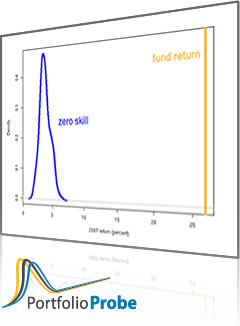Follow us using:
Newsletter Sign-up
Category Archives: Performance
Investment performance: measurement versus calculation
I recently had a frustrating — for both parties — conversation involving performance measurement. I said “measurement”. My dialogist heard “calculation” but wanted “measurement”. We went dizzy in the chase. Calculation and Measurement What’s the difference? A calculation is what computers do. A measurement is an assessment. It is a comparison with an ulterior motive. I’m … Continue reading
Expected returns of an investment mandate
What to expect from fund managers who follow your investment mandate. You hope that the fund managers that you hire have skill. But markets are noisy so it is hard to tell skill from luck. It is impossible to tell skill from luck if you don’t know what luck looks like. Here we draw pictures … Continue reading
Discovering the quality of portfolio decisions
Performance analysis of an example portfolio. The portfolio We explore a particular portfolio during 2007. It invests in S&P 500 stocks and starts the year with a value of $10 million. Initially there are 50 names in the portfolio. It also ends the year with 50 names but has up to 53 names during the … Continue reading
Not fooled by randomness
The paper is “Not Fooled by Randomness: Using Random Portfolios to Analyze Investment Funds” by Roberto Stein. Here is an explanation of the idea of random portfolios. Favorite sentence The real question here is whether we’re actually measuring skill, or these are still measures of performance, so influenced by extraneous factors that the existence of … Continue reading
Sharpe ratios, replacing managers and random portfolios
Two articles in the August issue of Journal of Asset Management discuss topics that relate to random portfolios. Sharpe ratios The first article is “The Sharpe ratio’s market climate bias: Theoretical and empirical evidence from US equity mutual funds” by Sebastian Krimm, Hendrik Scholz and Marco Wilkens (abstract). SSRN claims a version of the paper is downloadable, but … Continue reading
Posted in Performance, Random portfolios
Tagged Monte Carlo in finance, Sharpe ratio
Leave a comment
Jackknifing portfolio decision returns
A look at return variability for portfolio changes. The problem Suppose we make some change to our portfolio. At a later date we can see if that change was good or bad for the portfolio return. Say, for instance, that it helped by 16 basis points. How do we properly account for variability in that … Continue reading
Posted in Performance, Quant finance, R language
Tagged jackknife, statistical bootstrap
Leave a comment
Random portfolios: 6 steps to a better fund management industry
Only puny secrets need protection. Big discoveries are protected by public incredulity. — Marshall McLuhan Random portfolios have the power to improve the practice of asset management in several ways. Here are six. 1) Measure active managers There is no convincing evidence that more than a handful of funds have consistently outperformed. This should tell … Continue reading
Posted in Performance, Quant finance, Random portfolios, Risk
3 Comments
Performance measurement is about decisions
The return of a hypothetical fund was 17.9% in 2010. We want to know if that is good or bad. The benchmark method The assets in the portfolio are constituents of the S&P 500, so we can compare our fund return to the return of the index. Figure 1: 2010 returns of: the fund and … Continue reading
Posted in Performance, R language, Random portfolios
Tagged investment performance measurement, luck versus skill
4 Comments
Finding good active managers
Investors need to distinguish between good and bad active fund managers. Relatively new technology makes this much easier. The usual methods benchmark One of the common approaches is to compare funds versus a benchmark. Often much effort goes into choosing just the right index to be the benchmark. Should we use MSCI or something else? … Continue reading
Benchmarking low-volatilty strategies
Low volatility investing and performance measurement — my favorite topic scheme — how could I resist? The paper The paper is “Benchmarking Low-Volatility Strategies” by David Blitz and Pim van Vliet. The problem They claim that using a low-volatility index as a benchmark for a low-volatility strategy is not a good idea because: All low-volatility … Continue reading
Posted in Fund management in general, Performance
Tagged benchmark, low volatility investing
11 Comments
